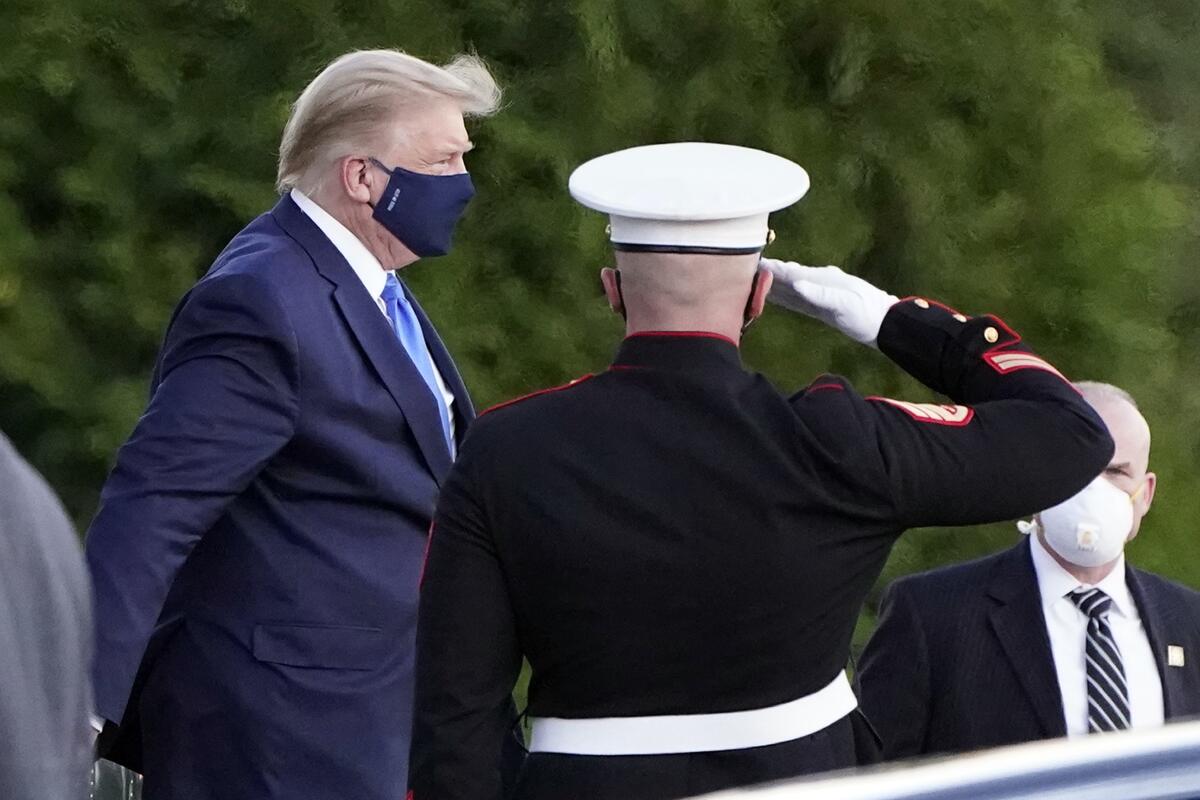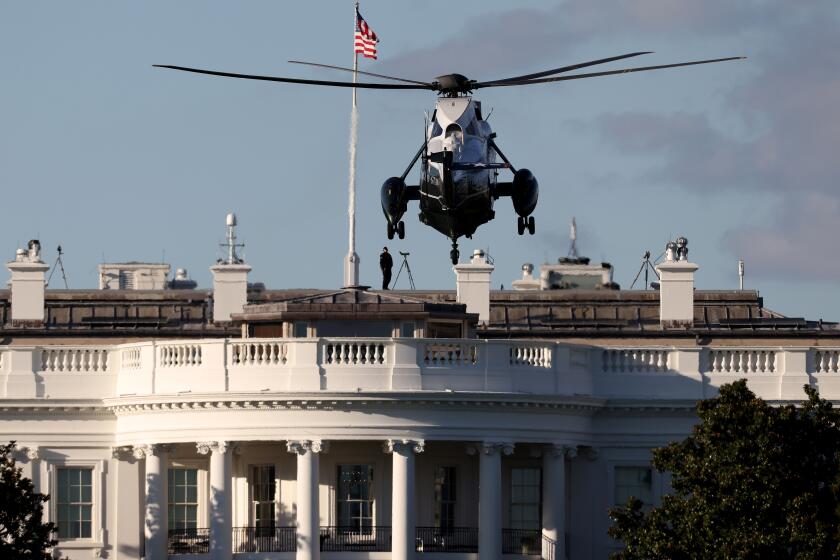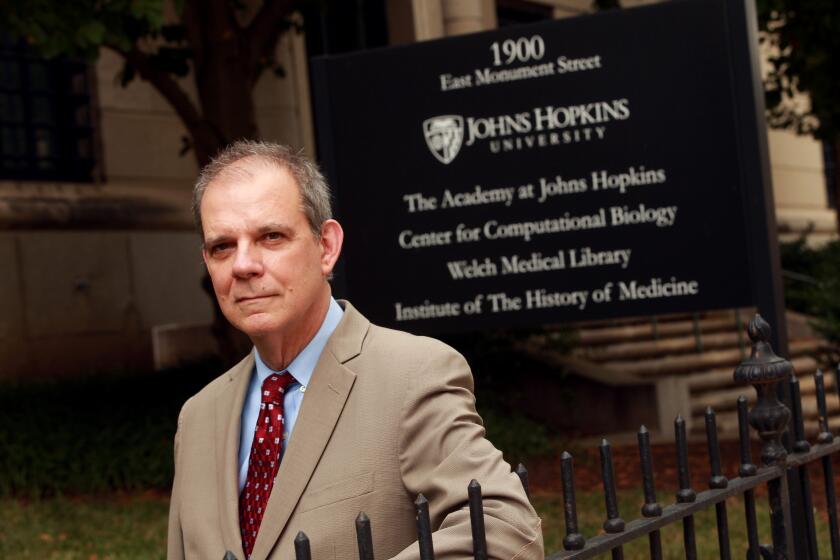What’s in store for Trump now that he has COVID-19?

- Share via
President Trump is now one of medicine’s most closely watched patients. But for all the medical care he commands, the president, who tested positive for coronavirus infection Friday and is reported to be suffering from “mild symptoms” of COVID-19, now confronts the same uncertainties that more than 7.3 million Americans have faced since the virus first appeared in the United States.
He could well be among the lucky patients — roughly half of those who test positive for the coronavirus — to emerge virtually untouched by illness. He could be among the nearly 3% of coronavirus-infected Americans who die of COVID-19.
Or his spin of the biological wheel of fortune could place him somewhere in the vast middle.
Landing in that “pretty lucky” zone still leaves plenty of room for misery. His symptoms could last a couple of days before he regains his strength. But he could also endure two weeks of coughing and fever, develop breathing problems that require days or weeks of mechanical ventilation and find himself weakened and exhausted until well past the Nov. 3 election.
“Here’s the thing that’s scary about this virus: It’s a probability game,” said Dr. Gregory A. Poland, an immunologist at the Mayo Clinic. “You don’t get to pick whether you’re going to get sick, die or have long-term outcomes.”
For the doctors at Trump’s bedside, the same uncertainty reigns.
After seven months of scrambling, physicians around the world have improvised, revised and refined treatments for COVID-19. In doing so, they’ve focused their efforts on patients with severe cases of the disease.
Trump’s medical team is keen to prevent the president from progressing to that state. The treatment of early disease, however, is a newer and more subtle challenge.
For now, they have opted to admit him to Walter Reed National Military Medical Center for a few days “out of an abundance of caution,” Press Secretary Kayleigh McEnany said.
President Trump will spend the next several days at Walter Reed National Medical Center for treatment of COVID-19.
That may reflect early signs of trouble in the president’s response to infection, and it came against the backdrop of other developments that suggest the same.
On Friday, the pharmaceutical company Regeneron said the president had been administered a dose of its “investigational antibody cocktail.” The decision to give him a drug that has not received extensive vetting by the U.S. Food and Drug Administration — permission was granted under a “compassionate use” program typically reserved for extremely sick patients who are willing to try almost anything — was highly unusual.
More striking was Regeneron’s recent description of the drug as a “substitute for the naturally occurring immune response” in patients who were “less likely to clear the virus on their own and were at greater risk for prolonged symptoms.”
The compassionate use of a drug is “usually done in very dire, life-threatening circumstances, and that tells me the doctors are very worried about him,” said Arthur L. Caplan, a medical ethicist from New York University’s school of medicine.
Caplan said the move was “high-risk,” given that the drug in question does not have an established safety record. But he added that it’s “not indefensible” if the president’s condition were extremely worrisome.
Trump’s physician, Dr. Sean Conley, announced late Friday that the president had begun a course of the antiviral medication remdesivir and had tolerated his initial dose well. When given to hospitalized patients relatively early in the course of illness, remdesivir can shorten the typical patient’s recovery from 15 days to about 11 days, clinical trials have demonstrated.
Doctors’ decision to hospitalize the president might suggest they are also readying him to receive convalescent plasma therapy. This treatment involves giving COVID-19 patients additional coronavirus antibodies from people who have already recovered from the disease.
The FDA has authorized it for emergency use but only in patients sick enough to have been hospitalized. Though widely viewed as safe, its effectiveness at preventing death or shortening disease is still being tested in large clinical trials.
Scientists searching for a medicine to treat patients with COVID-19 are looking for it in the blood of people who have already survived the disease.
And then there are the more specific risks faced by Trump.
Though he insists he is in excellent health, the 244 pounds he carries on his 6-foot-3 frame give him a body mass index of 30.5, which qualifies him as obese, and obesity is considered a risk factor for developing complications from coronavirus infection.
At 74, Trump is well into the senior age group that is particularly vulnerable to COVID-19. Deaths are also more common among men than women.
In terms of surviving COVID-19, however, he does have the key advantage of being a non-Latino white person.
Trump’s illness has kicked off an intensive contact-tracing effort to track down the many political leaders, policy advisors, business executives and regular Americans with whom he has come into contact over the last several days in the course of presidential duties.
President Trump has risk factors that make him more likely to experience a severe case of COVID-19, including his age, sex and obesity.
In the space of a week, he held a large Rose Garden ceremony to nominate a potential Supreme Court justice, hosted dozens of gold star family members who lost a loved one in the course of military service and headlined campaign rallies and fundraisers in Minnesota, Pennsylvania and New Jersey. Few attendees at these events wore masks, and the crowds generally did not follow guidelines on social distancing.
Some observers have theorized that the coronavirus was an unwelcome guest Saturday when Trump presented Judge Amy Coney Barrett as his choice to succeed Justice Ruth Bader Ginsburg. More than 100 people attended the event, mingling and hugging before sitting in tightly packed rows, as in pre-pandemic days.
In the days since, attendees Sen. Mike Lee of Utah, Sen. Thom Tillis of North Carolina and University of Notre Dame President John Jenkins tested positive for coronavirus infections.
Trump’s diagnosis has prompted other contacts to get themselves tested.
Democratic presidential candidate Joe Biden, with whom Trump shared a debate stage for 90 heated minutes, said he received a negative test result Friday. Fox News anchor Chris Wallace, who moderated the debate, told viewers of his network that he would wait until Monday to get tested, on the advice of his doctors.
Poland, of the Mayo Clinic, said Trump’s physicians will probably be under intense pressure to treat the president more aggressively than evidence in hand can support.
They will be anxious to show that they have not withheld any treatment that could be beneficial. But as they treat him under the glare of public scrutiny, they will have to weigh that impulse against potential risks that have not been fleshed out in clinical trials. And they would do well to remember that sometimes, less treatment is more.
“Having taken care of many VIPs, I can tell you, it is a very difficult and delicate dance,” Poland said. Patients intent on getting aggressive treatment “eventually find somebody” to provide it. But in the Hippocratic oath, he added, “the very first principle is, ‘Do no harm.’”
The determination of Trump’s physicians to keep severe illness at bay may explain a series of steps that would otherwise convey urgency and concern, Caplan said.
“Presidential medicine is not the same as medicine for you or me,” he said.
But if the White House wants to shore up Americans’ confidence that such aggressive steps are justified, “they’ve got to tell us” why they’re making their decisions, Caplan added. “There are things they’re not coming clean about.”










